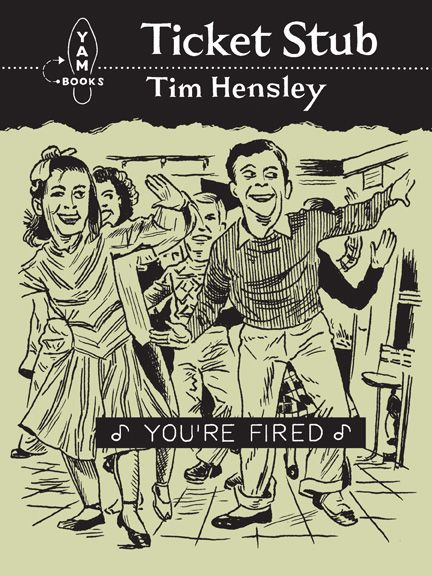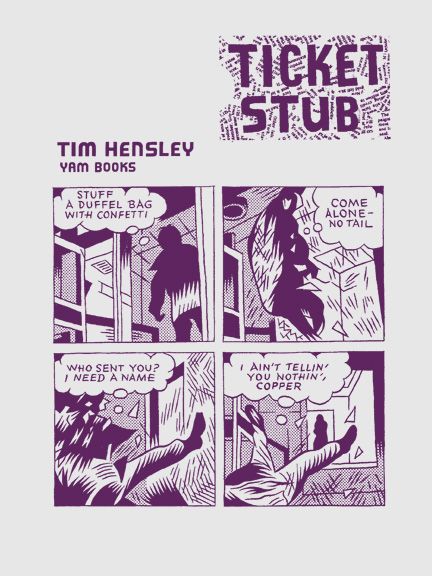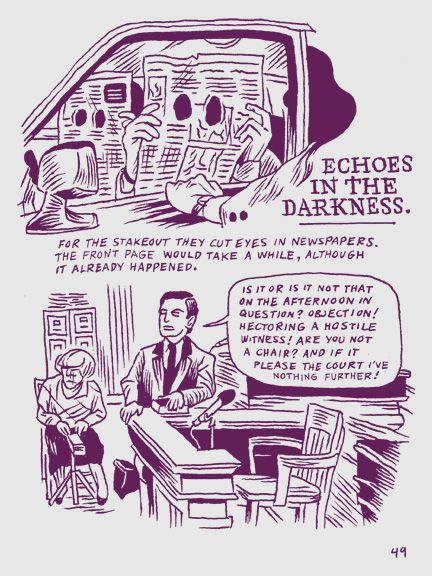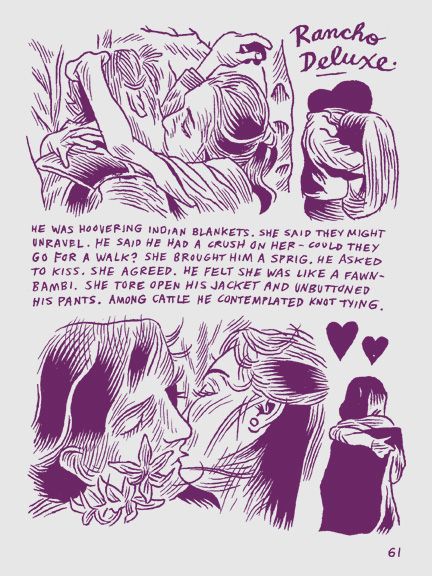I first came across Rina Ayuyang's work with the arrival in 2010 of Whirlwind Wonderland, which collected her various minicomics in one slim book. Iwas quite taken with the warmth and good humor she displayed in detailing her life, family and relationships, and I dubbed it one of the most criminally ignored books of that year.
While she's still putting out the occasional minicomic, Ayuyang has recently become a small-press publisher with her new imprint Yam Books. The company is off to an excellent start with its first book Ticket Stub, by Tim Hensley, which came out late last year. The book, which collects the off-kilter minicomics Hensley created while working at his former day job as a closed-caption editor is a head-spinning series of dada-esque riffs on popular movies.
Curious about what sort of challenges Ayuyang might have encountered in making the transition from indie cartoonist to indie publisher, I asked whether she'd be up for answering some of my invasive questions. Thankfully, she was more than happy to do so.
ROBOT 6: What made you decide to make the transition from artist to publisher? Were you always interested in publishing?
Rina Ayuyang: For a while, I managed this old web zine that showcased work of artists, and I've always been into collaborating and editing projects with other artists. So I always had an interest in promoting people's work, not necessarily in running a publishing company, but helping an artist get a book to print. As a cartoonist, you see the work of other cartoonists and you automatically get inspired by what they do and you can't help but just root for them. I've found myself nagging a couple of publishers to get them to publish certain artists. Being a self-publisher for most of my comics career, I've picked up this DIY way of thinking that if no one is going to publish a certain book, than I will do it! Why not? It's a very naive thinking in a business sense, I suppose.
I want to also say that I'm still drawing comics, but I've realized that it really is difficult to keep that up once you're a publisher. One time, I told Dylan WIlliams that I was thinking of being a publisher. And he actually advised against it basically because it takes you away from your own comics, and he knew that I loved drawing my own comic. And he's completely right. He's right about a lot of things. I've been finding that out a lot more now that I'm a publisher.
How long did it take you from initially planning to form Yam Books to getting it set up?
It was a blur, really, when it all started. I think when I was talking to Tim Hensley about doing a book, I didn't even have a company in my mind, or a name for a company yet. Then I was talking to Lark Pien about a project she was working on called Lollygag, a sketchbook anthology of doodles by a bunch of really great cartoonists which sounded amazing and I really wanted to see that get printed. Lark did pretty much everything for that book. She not only edited the book, but did the book design, hand-pulled the debossed covers, hand-bound the books, which is no easy feat. I just helped with the printing and distribution. So I guess I was starting a publishing company without really knowing that I was. I was really flying by the seat of my pants in the beginning, but now I have plans and rules in place, so that it's all organized and manageable.
What was the biggest challenge for you in setting up the company?
The biggest challenge was just learning everything all at once -- learning about printers, about turnaround times, and especially the business and administrative side to it all. I never thought about profit margins before because I never made a profit from my own comics, and I just accepted that fact. As a publisher, you have to change that way of thinking fast. There is no room to be self-deprecating and you have to remember that your attitude and business practices affect others' well-being and livelihood, not just your own. The artists you publish depend on you, and you feel extra motivation to do right by them -- to make sure you're doing everything, shaking every tree, to make sure their book is out there and doing well. You just can't take it lightly.
Another challenge is that I have to be very, very, very picky with what projects I want to work on because of my limited amount of resources and bandwidth. I want to publish a lot more titles in a year, but it's just not feasible right now.
Why Yam Books? What's the significance of the name?
Well, it has nothing to do with the root vegetable. As a kid, I became a huge musical/dance buff, a big-time Astaire and Rogers fan. One of my favorite movies of theirs was Carefree, which had this amazing, but kooky, dance number called The Yam. It mimicked someone walking around holding a tray of yams. Obviously it wasn't a very glamorous dance, but when I saw it, I was in such awe. I'd practice that number for weeks on end after that. Basically, it made me happy.
As a self-publisher, sometimes you can get a bit narcissistic. You are so used to promoting yourself, and wondering what people think of you. It's all about ME, ME, ME, but when you are a publisher, you have to give that up a bit. It helps a whole lot when you only work on projects that are very near to your heart because you invest a lot of time and resources on it. So I wanted to choose a name that strangely enough encompassed the same bright-eyed enthusiasm I had watching the chemistry and exuberance of dance numbers with the enthusiasm that I feel about the books that I wanted to publish through Yam Books.
What made you decide to start with Ticket Stub? What is it about Hensley's work that appeals to you?
I have always been a fan of Tim's work from anthologies and his minis. The one thing I like about his comics, and I guess what I like in comics in general, is how much he as an artist challenges the reader to work, to figure it all out. It's like a jigsaw puzzle, a brain teaser. Tim asks his readers to fit an image with seemingly disconnected writing to create this harmonious and usually hysterical narrative. Tim also did some drawings for my small zine anthology Pet Project, so I knew he was great to work with.
When I was in Minneapolis for MIX two years ago, I saw his work again in the big TCJ 300 book, while perusing through comics at Big Brain Comics. It was a nice surprise because I had no idea that he was going to be in that issue. So I just asked him if he was ever interested in publishing any sketchbook stuff (because I was planning on doing a small book series on artists' sketchbooks) or any side projects, that I'd be interested in working with him.
We decided on doing a collection of his minicomic series Ticket Stub. When Tim was making these minis, he only made about 15 copies of each issue. He pretty much only gave them to close friends and family, or maybe someone at a comics convention. Se we really wanted to share Ticket Stub with a wider audience, and those who only knew his drawing style from Wally Gropius. We also wanted to make it available to people who knew about the minis, but weren't lucky enough to get a copy. Tim is one of the best guys to work with, especially for the first project as a publisher. It was a great collaboration. He's very professional, very organized, really has his stuff together. I'm really happy about the book. It's one of those books you want to always have nearby as a resource on how to draw. Tim drew these strips during his breaks when he was a closed-captioning editor years ago in LA. With such little time to spend drawing them, the quality of his work is amazing. So, for me, the book is also as a source of inspiration to start or keep drawing even if you don't have time to.
How do you see Yam Books standing out from the rest of the small-press crowd? What makes it different than, say, Sparkplug, Koyama or Secret Acres?
Ha, well, I don't think Yam Books stands out, especially from that group you listed. I feel like those guys really have their stuff together, and I'm totally starting out. I feel though that I'm on a nice steady path that is manageable with all the other aspects of my life. If anything, I feel like there is a kinship among all of these publishers. I have gotten a lot of support, especially from Annie Koyama, Tom Kaczynski, and Greg Means. A lot of great advice. We've helped each other at shows, like I had Koyama Press titles at my table at APE here in the West Coast, and Koyama Press will have Yam Book titles at her table at this coming TCAF. And I think we bring a lot of different things to the table, different tastes and styles of comics to showcase and get into people's hands.
You mentioned the difficulties of doing your own comics when becoming a publisher. What about your own work? Are you planning a follow-up to Whirlwind Wonderland anytime soon?
It's been difficult for me to stay focused with work, a family, Yam Books, and working on my own comics, but I am staying optimistic that I can still be a cartoonist and a good publisher at the same time. Recently, I managed to put together a small mini-comic called Outta This Comes the Crazy that collected strips about being pregnant and becoming a mother. But, yes there will be a follow-up to Whirlwind soon, at least, that is the plan! It's called Blame This on the Boogie. I had planned to publish it early last year, but drawing it has been stop and go at this point. It's an autobiographical work that incorporates my love for dance and a recent obsession with a reality TV show, and how that all has affected my family and my life experiences. Cheesy, I know.
What do you have planned for 2013? Can you tell me a little bit about the books you're planning for this year and further down the road?
This spring, I'm excited to debut Sacha Mardou's second issue of her comic series Sky in Stereo. I've been a fan of her work for a long time, and especially the Sky in Stereo series. Her stories are so engaging and smart. I'm honored to be publishing her stuff through Yam.
This fall, we'll be releasing a book by Renee French, Hagelbarger and That Nightmare Goat. Hagelbarger is a sea creature that was first introduced in the Digestate anthology. I'm glad that we'll get to read a longer story with one of Renee's favorite characters. After that, I'm working with Chicago cartoonist and illustrator, Onsmith on a collection of favorite comics, gag strips, new works and drawings. I have always loved his mini-comics, and the print work that he has done. A collection of his work just needed to be done, basically. And I'm also working on a new Zurik Robot comic with Martin Cendreda that we are aiming to have next year. So I'm really excited. It's a crop of artists whose work I've always admired and they also just good people in general, so I'm happy and thankful to get the chance to work with them.





